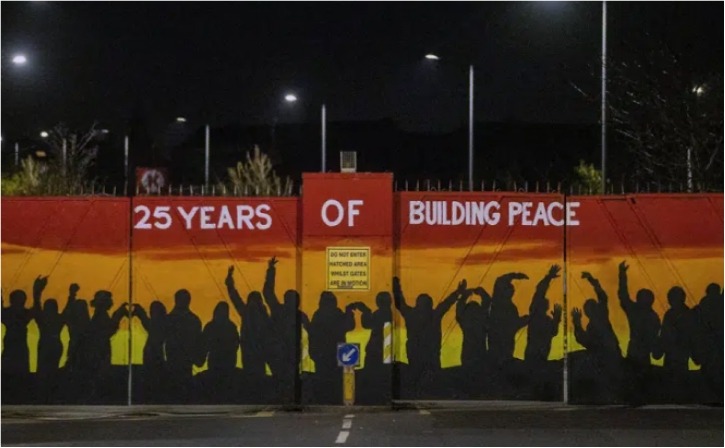
Police in Northern Ireland have issued a warning about the possibility of violent attacks by armed dissident groups during the Easter holiday weekend as the country marks the 25th anniversary of the Good Friday Agreement. The peace accord, signed on April 10, 1998, brought an end to three decades of bloodshed in the region, which had claimed the lives of 3,600 people. Despite the peace, small splinter groups of Irish Republican and British Loyalist paramilitaries have continued to mount occasional gun or bomb attacks on the security forces, leading the UK authorities to raise Northern Ireland’s terrorism threat level to “severe” last month.
The Easter weekend is a time of heightened tension in Northern Ireland as it coincides with the anniversary of the 1916 Easter Rising, a rebellion against British rule in Ireland. This year’s commemorations are particularly significant as they mark the 25th anniversary of the Good Friday Agreement, which brought about a power-sharing government for Northern Ireland and paved the way for the release of prisoners jailed for their involvement in the violence.
The threat from dissident groups has prompted the police to put in place extra security measures over the holiday weekend, with officers and military personnel on standby to respond to any incidents. Police Chief Constable Simon Byrne has warned that dissident groups may target police officers, military personnel, prison staff, and their families. Speaking at a press conference, he said, “We have information that indicates that dissident republican groupings are planning to mark this anniversary with acts of violence. We know that they have the intent, we know that they have the capability, and we know that they have access to firearms.”
The warning comes as US President Joe Biden prepares to visit Belfast next week. His visit will coincide with the anniversary of the Good Friday Agreement, and he is expected to use the occasion to reiterate his support for the peace process. Speaking ahead of the visit, the President said, “I look forward to the opportunity to reaffirm the special relationship between the United States and the United Kingdom and our commitment to working together on global challenges like climate change and Covid-19. I will also have the chance to underscore our long-standing support for a peaceful and prosperous Northern Ireland.”
The Northern Ireland Assembly has not sat for more than a year after the main unionist party, the Democratic Unionist Party (DUP), pulled out of the government to protest new post-Brexit trade rules for Northern Ireland. The party has accused the UK government of betraying Northern Ireland by agreeing to a protocol that keeps the region in the EU’s single market for goods. The protocol has led to customs checks on goods moving from Great Britain to Northern Ireland, which the DUP says threatens Northern Ireland’s place in the UK.
Despite the current political crisis, many believe that the Good Friday Agreement has been a success, bringing an end to the violence and allowing Northern Ireland to move on from its troubled past. Speaking at a ceremony to mark the anniversary, former IRA-linked party Sinn Fein leader Gerry Adams said, “The Good Friday Agreement is a historic compromise which saved countless lives and ended an armed conflict that had gone on for far too long.” He added that it had brought about “a new beginning” for Northern Ireland.
Former Ulster Unionist Party leader Reg Empey also praised the agreement, saying that young people in Northern Ireland were now “the second generation that has grown up in this country who have no working knowledge of what violence and our Troubles meant.” He added that it was important to remember the sacrifices made by those who had lost their lives during the conflict and to ensure that their memory was not forgotten.
The events planned for the 25th anniversary of the Good Friday Agreement have been disrupted by the rise of sectarian violence in recent weeks. A bus was set on fire in Belfast in the Shankill Road area in March, while police have also come under attack. Northern Ireland’s police chief, Simon Byrne, warned of the increased risk of violence in the coming days, stating that dissident republican groups pose a threat to the public and the police.
While the majority of Northern Ireland’s population welcomes the peace accord, there are still some who are opposed to it. The agreement created a power-sharing government, with unionists and nationalists sharing power in Northern Ireland’s Assembly. However, the government has not sat for more than a year due to disagreements over post-Brexit trade rules.
The issue of Brexit has also caused a stir in Northern Ireland, as it has raised concerns about the return of a hard border between Northern Ireland and the Republic of Ireland. The border was removed as part of the Good Friday Agreement, and any reintroduction could be seen as a violation of the accord.
Despite the ongoing challenges, the 25th anniversary of the Good Friday Agreement is an important milestone for Northern Ireland. The agreement has allowed a generation of young people to grow up without the constant threat of violence and has helped to create a more peaceful and stable society.
As Northern Ireland commemorates the signing of the peace accord, President Joe Biden is set to visit Belfast next week. His visit will underscore the United States’ continued support for the peace process in Northern Ireland.
